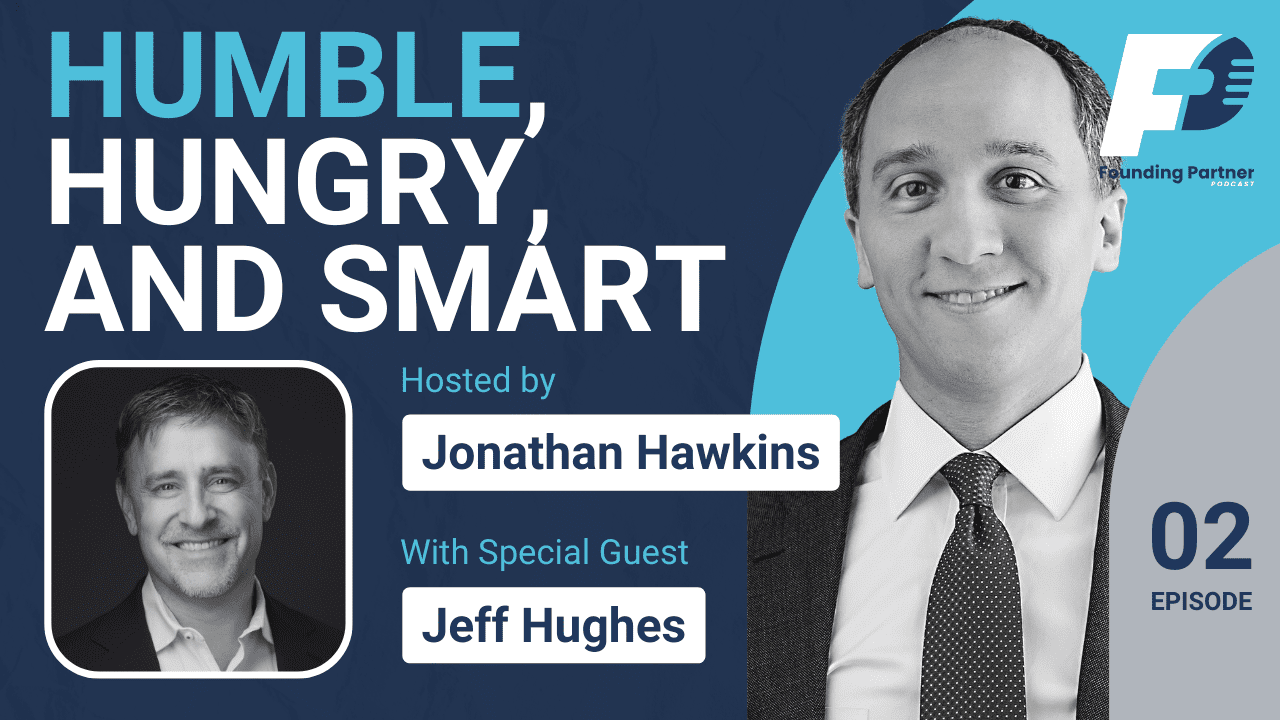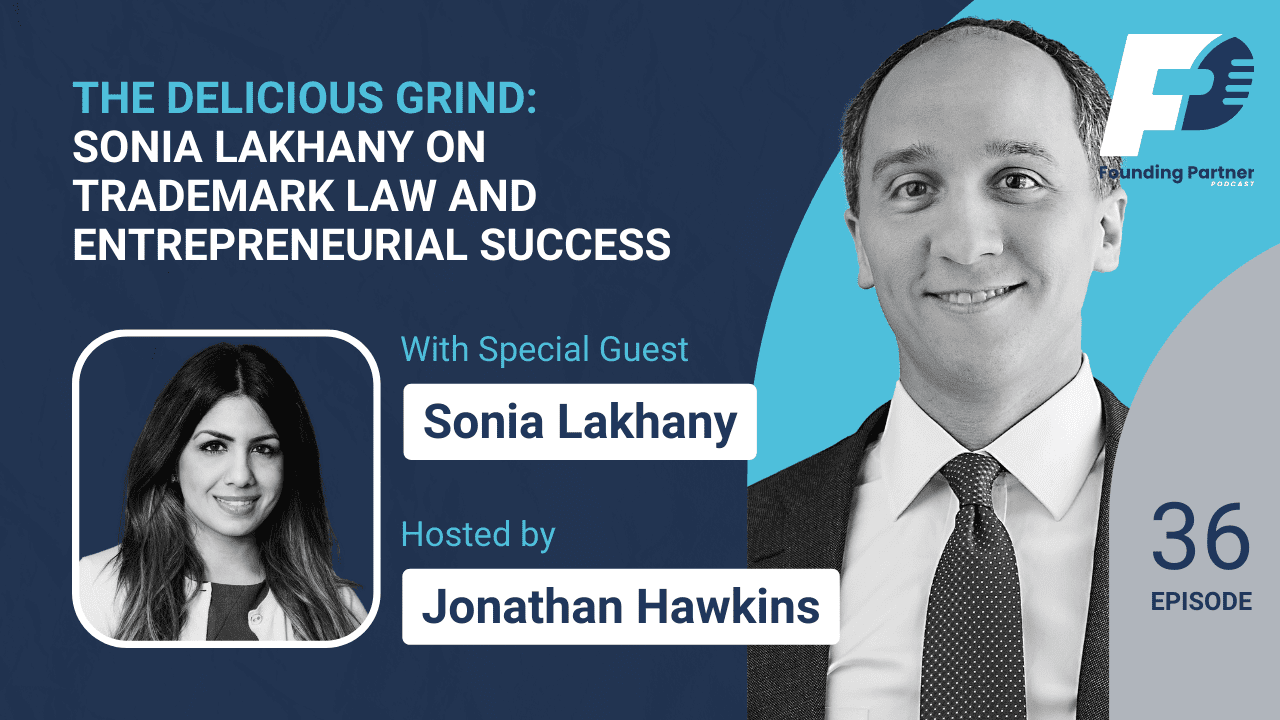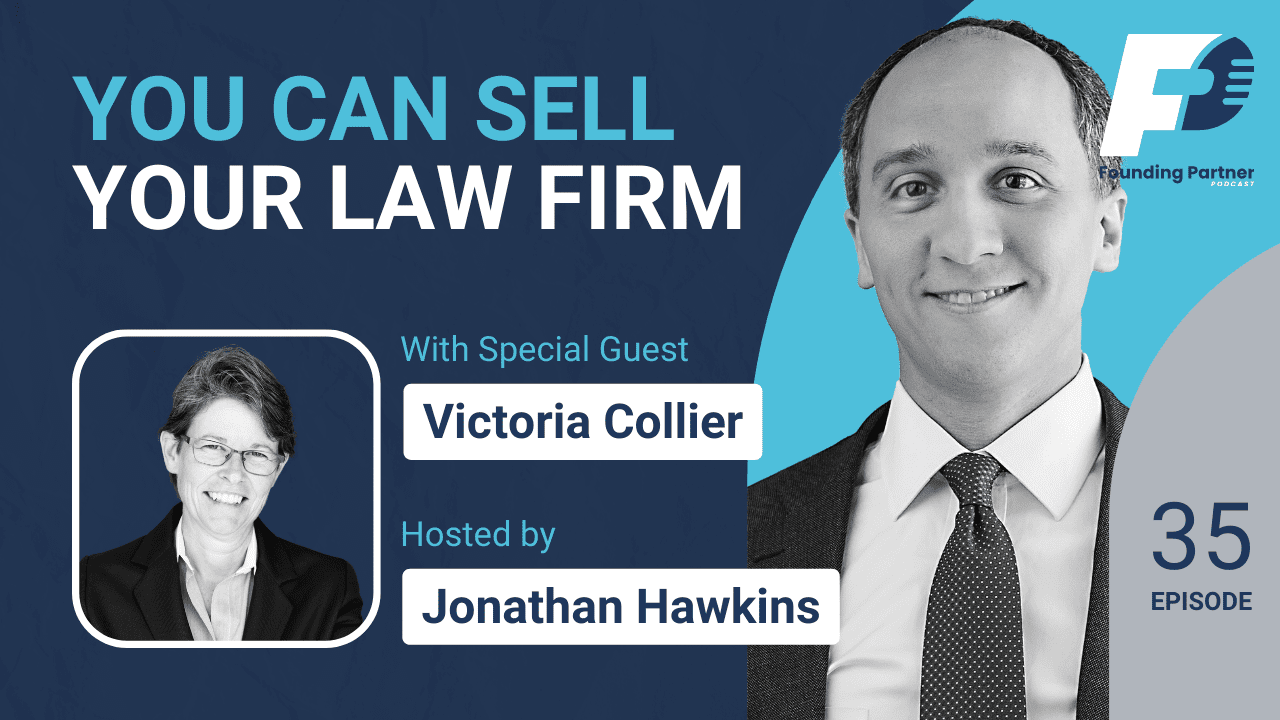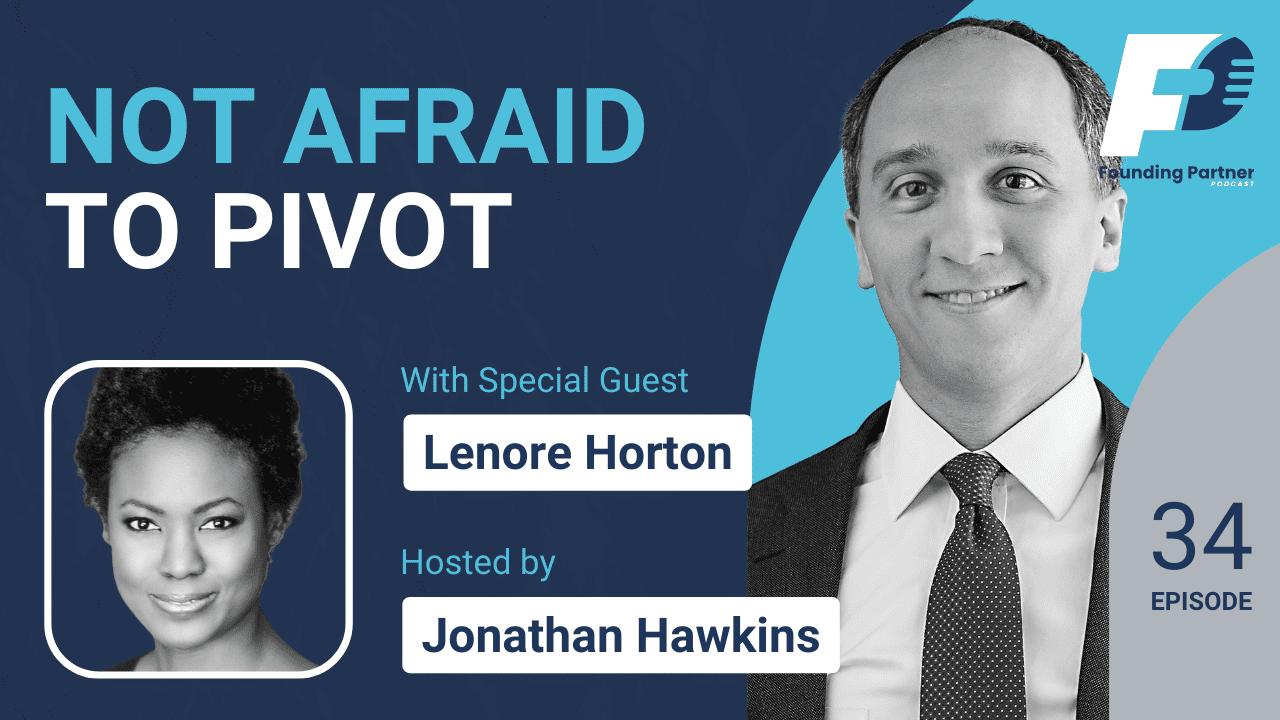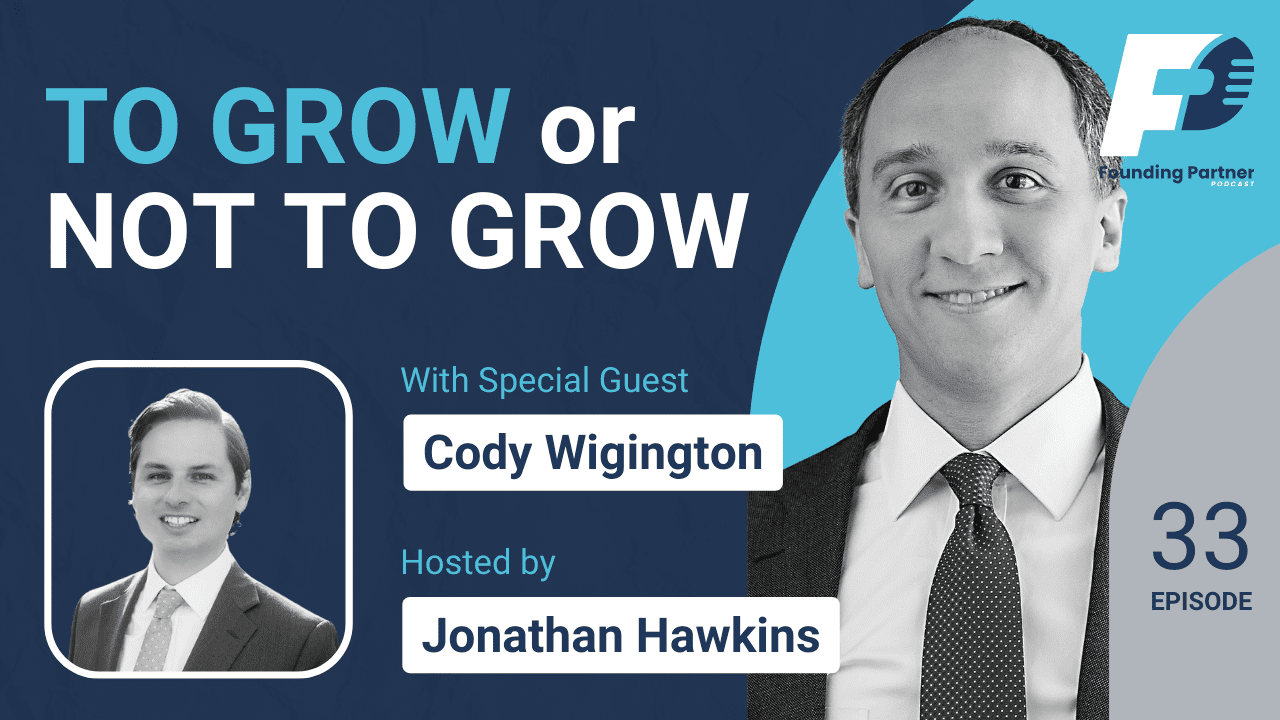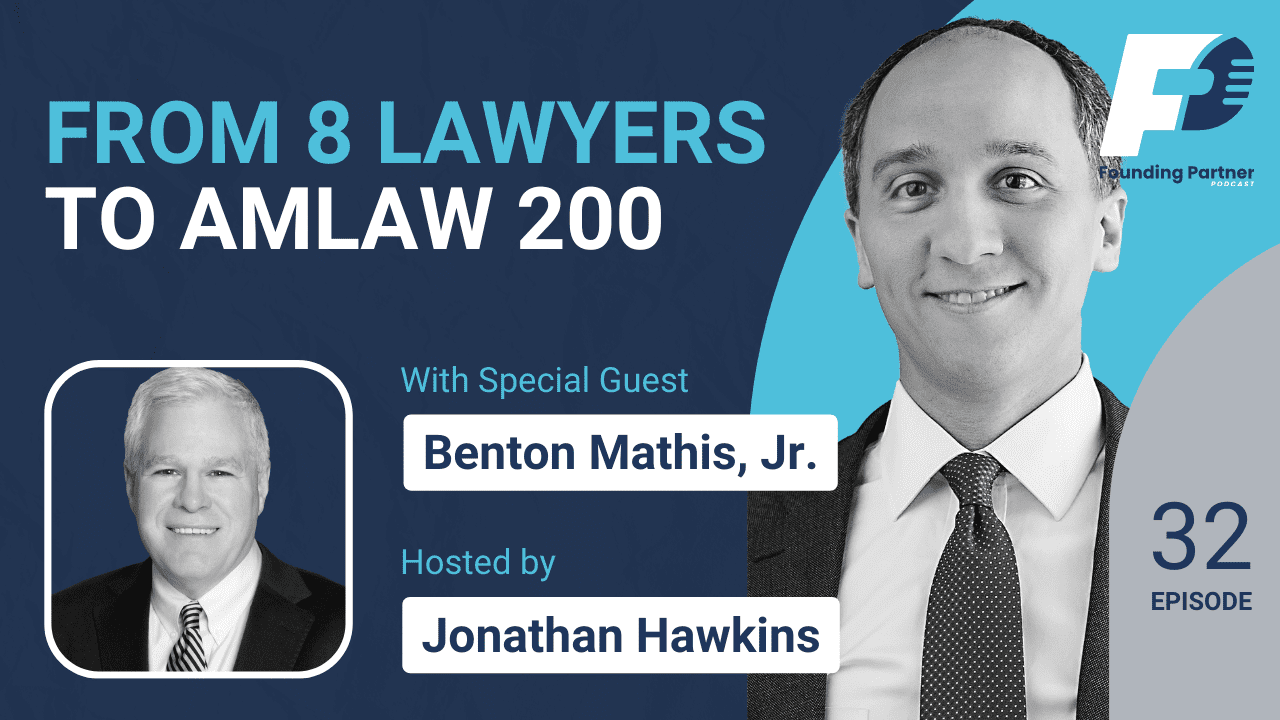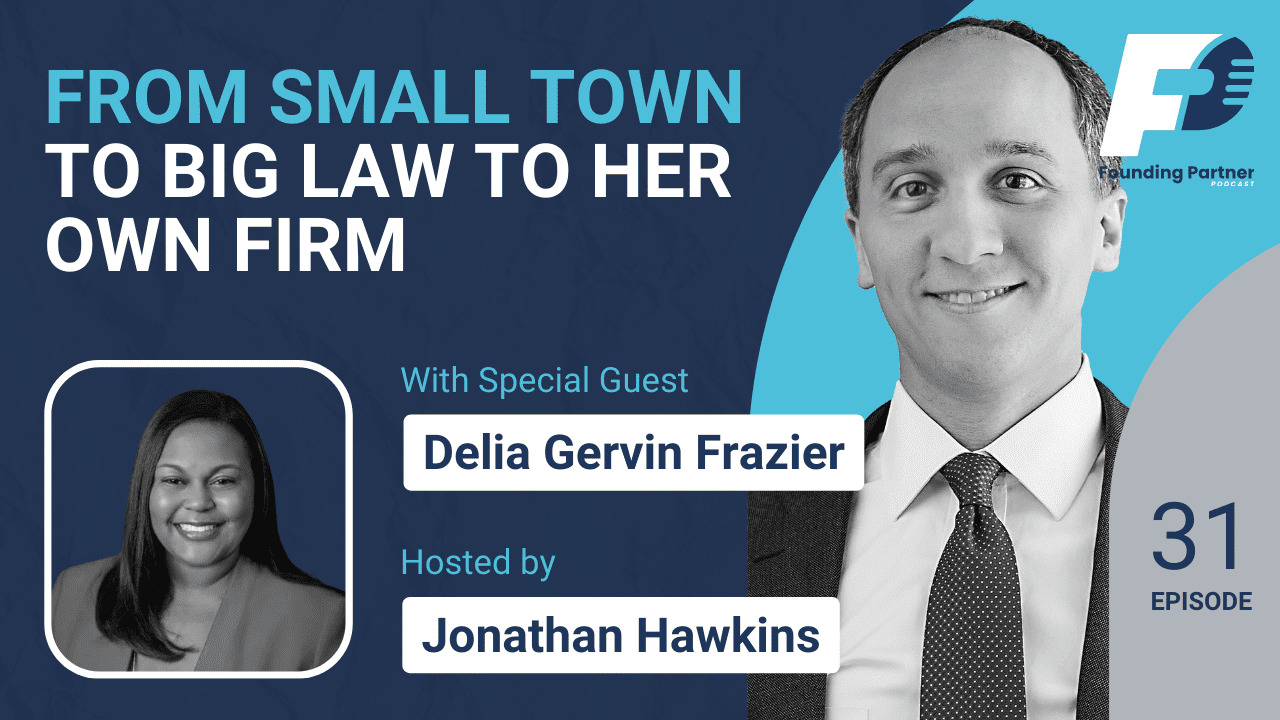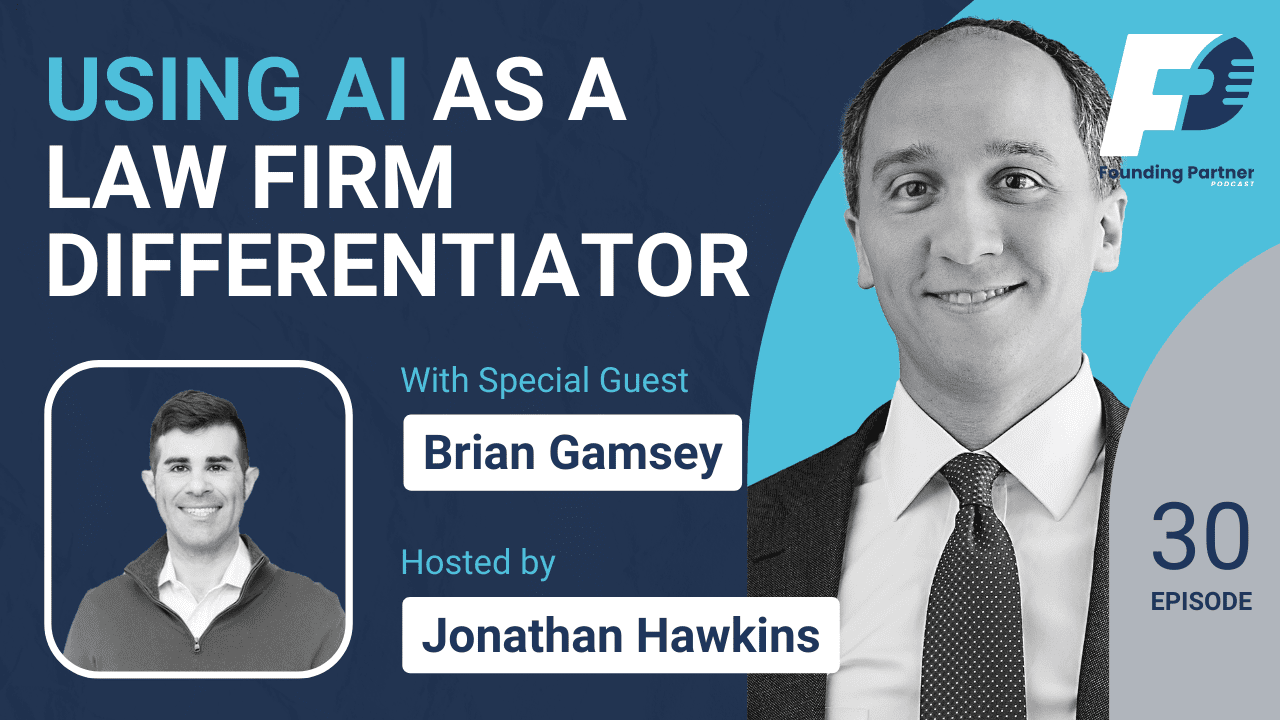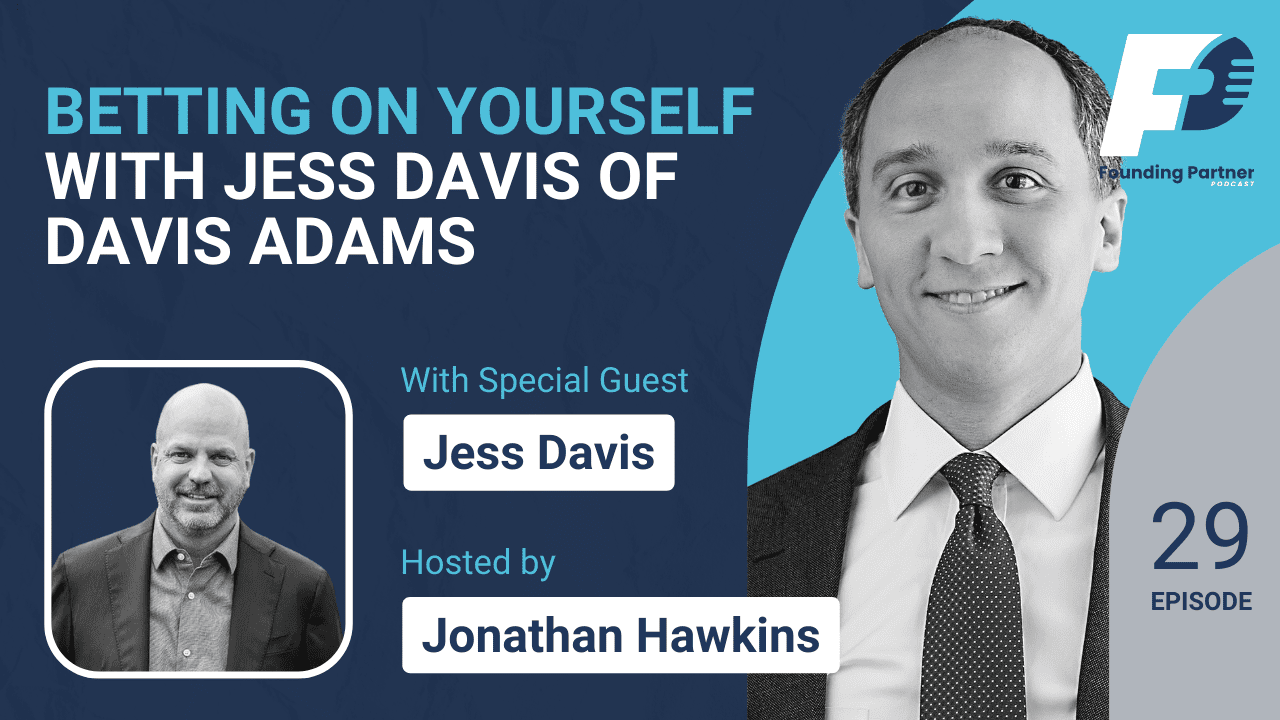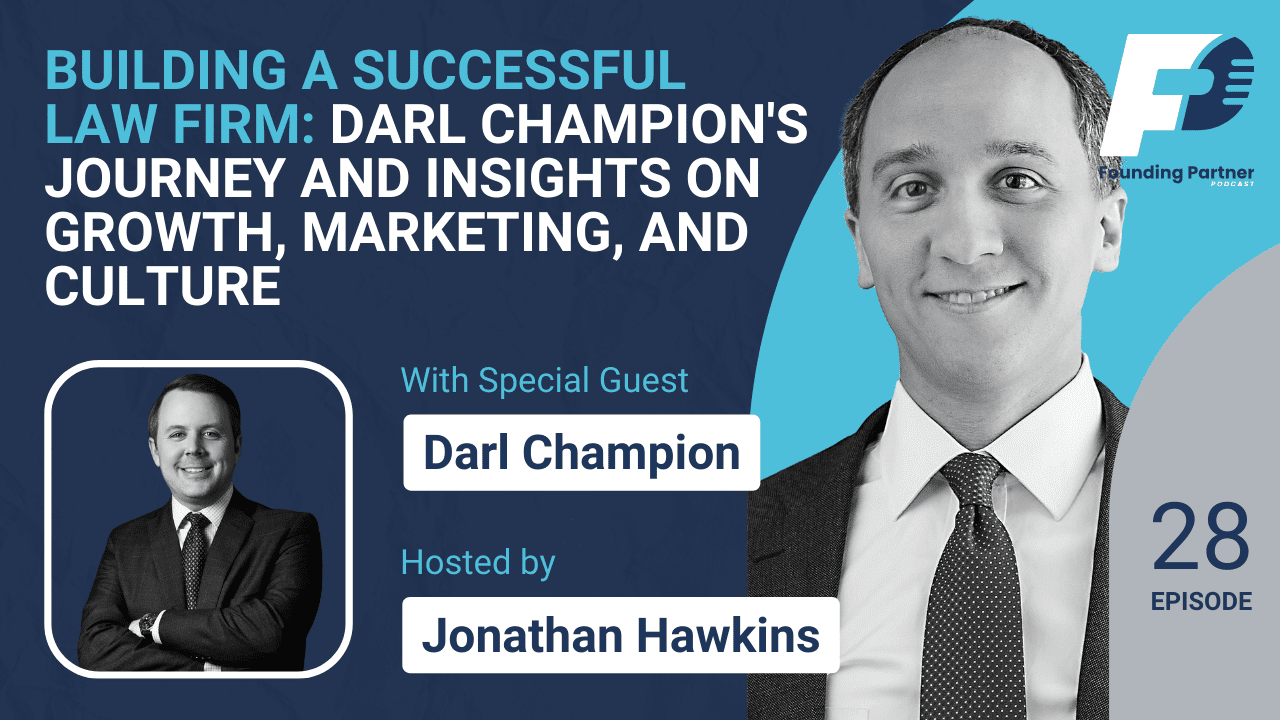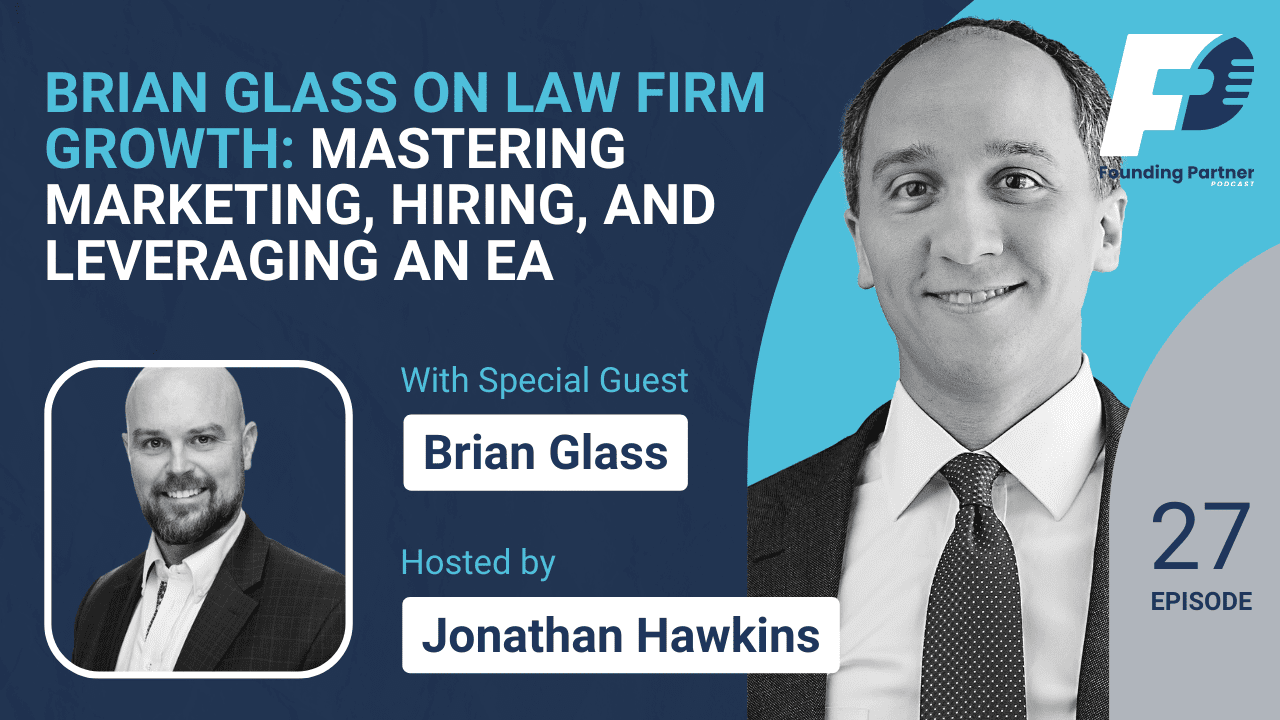Jeff Hughens: [00:00:00] Our first real challenge of rebuilding our systems and starting over, that’s when we had to kind of redo our backend system the first time. So that started happened around one and a half to 2 million. And then we were pretty good up until we got to about 8 million. And then somewhere between eight and 9 million, we just hit a wall.
And it was pretty painful, and we looked at our entire firm and we spent about four months trying to identify what had to change and we boiled it down to really six areas and it took us about two years from there to fully execute on that, on all that system change. But when we did it, it revolutionized the firm.
[00:01:00]
Jonathan Hawkins: All right. Welcome to the founding partner podcast. I’m Jonathan Hawkins founder of law firm GC. We’re a law firm that represents law firms and lawyers in business related matters. I’m very excited about our guest today. Jeff Sterling Hughes. Jeff, why don’t you introduce yourself?
Jeff Hughens: mY name is Jeff Hughes and I’m the CEO of Sterling Law Offices based out of Milwaukee, Wisconsin. We’re a family law firm focusing on just fixed fee. We have offices throughout Southeastern Wisconsin and Northern Illinois in the Chicagoland area.
Jonathan Hawkins: So when did you start your
Jeff Hughens: deeper?
Jonathan Hawkins: What’s that?
Jeff Hughens: I can go deeper. I
Jonathan Hawkins: We’re going to go
deeper.
Jeff Hughens: and law. Okay. Okay.
Jonathan Hawkins: So yeah. So, so how long have you been, how long have you had your own firm?
6c995a25-1649-47ba-996a-681c590757da: own firm?
Jeff Hughens: So we started the firm in 2014. And then we were a general practice [00:02:00] firm doing a little bit of everything. And then we pivoted and focused just on family law starting on February 1st of 2016. So it took us about 18 months to realize that we didn’t want to be all things to all people. So,
Jonathan Hawkins: So what led you to make that pivot?
Jeff Hughens: well, we started off Jonathan with one lawyer and whatever clients, I think he brought 11 clients over from his firm. And away we went and we grew really rapidly in the first 18 months or so up to eight lawyers and legal staff and we were just on the outside. We were doing great. Things look like magical because all this rapid growth and everything.
We were doing a little of everything. Family law, criminal law, P. I. I think we even had like a liquor license deal in there and some state planning. And the truth is we were just not good. We sucked and sucked in the sense that we were getting Bar complaints, many client complaints. We just did not like where we were going to hated it.
So my partner Tony and [00:03:00] I decided we wanted to do something different. We didn’t want to spend our careers just be mediocre and just not focus. And so we went away and met with a consultant. And down in South Beach and spent two or three days thinking through what we want to look like. And we came back and said, we’re going to rip the bandaid off.
We’re going to go just family law. We’re going to cut our firm in half, let about 40 percent of our clients go and start over. So that’s what we did. We did that. And right at the beginning of 16.
Jonathan Hawkins: Wow. So how scary was that?
Jeff Hughens: Super scary because we had a refund, a bunch of clients, of course, we had to pay severances, like great teammates go, they didn’t, it was no fault of their own. And we went from eight lawyers down to four and focused just on family law. And so it was like a white knuckle moment with money going out the door way faster than it was coming in.
And I’m not going to lie to you, it was hairy. And, but we felt it was the right call. We knew long term that’s where we wanted to be. We wanted to be, we wanted to be great at one thing. And to be great at one thing, you got to say no to a lot of things. So a lot of sacrifices go along with that.
And the problem that we [00:04:00] had was we could get clients. And so I was of the mindset, boy, if we can get clients, let’s just take them. Let’s just figure it out. And that was completely the wrong way to go about doing it.
Jonathan Hawkins: And so, so you went from eight down to four. Where are you now, attorney count?
6c995a25-1649-47ba-996a-681c590757da: count,
Jeff Hughens: Believe we’re at 25 right now as we sit here.
Jonathan Hawkins: Wow. And 25 attorneys, how many non attorney staff do you have?
6c995a25-1649-47ba-996a-681c590757da: do you have?
Jeff Hughens: I Think we have a total around mid eighties, a turn of total teammates. So take out the 25, but you’re about 60 support staff. A lot of those are in intake and marketing functions. We have an it function back office for HR and finance. And of course our paralegals and legal assistance as well.
Jonathan Hawkins: Yeah. So there’s a lot I want to dive into on the law firm front. But before we get to that, I want to step back because after law school, I think you worked as a lawyer for a while and then you did something else. So take us through that.
Jeff Hughens: Yeah. Okay. So I got out of law school in 97, came up here to [00:05:00] Wisconsin. I’m in a suburb of Wisconsin and took a job at a community law firm with five attorneys. And we did a, Just kind of what you would imagine in a community doing a lot of service for the people that lived around us. We had a state planning practice, a PI practice, a family law, criminal law, just a little bit of everything and to serve in the community.
So I did that from 97 until 2005. And then, and right at the end of 04, beginning of 05, I had a client come to me and say, Hey, I have a good idea. Now, I should have known because
6c995a25-1649-47ba-996a-681c590757da: He
Jeff Hughens: was one of my criminal offense clients and a super creative guy, but I’m not everything, you know, he told me was always accurate, but I believed it and thought I’d just take a jump.
So I started a little side hustle. I’m selling dish network satellite. And that. turned out to be just a great move. And that business just exploded and took off. And at our peak, a couple years later, we’re around 20 something [00:06:00] million low twenties and about 200 teammates. And so I was out of the practice by that point.
So I left at the end. It took me about a year to get out of the practice. I left in at the end of 05 and did that. And then, as you know, I mean, Satellite TV and cable TV has really taken a hit over the past five or six years as Netflix and all the streaming services have come online. So that business began to wind down.
And as we could see the horizon we didn’t want to try to push through that. So we looked at doing another business and we said, let’s just start a law firm because I have a law degree and I could do that. So that’s what we did. So we started started researching how we wanted to do it. And so we started that at the end of 14 and actually, yeah, middle 14 or so, actually we started it.
Jonathan Hawkins: And so before you started the Dish Network company, were you a partner at that firm? Had you become partner?
Jeff Hughens: Yeah. So I had made partner. I was a minority partner. So there were two other ones. They own the vast majority of the firm. And when I left the practice, that first [00:07:00] firm, I was a small partner in that. And so they bought me out basically over the ensuing 15 or 16 months or so. They just paid me out all my collections and so forth.
And that’s kind of how they bought me out.
Jonathan Hawkins: So you got to see sort of the inner workings of the business of law, at least from that old school law firm. And then you went and did business. And I imagine it’s night and day, learn a lot of stuff actually doing business, right?
6c995a25-1649-47ba-996a-681c590757da: right? Complete
Jeff Hughens: night and day. In fact, when I was at the first firm, I was really ambitious. I just wanted to go after it and try new things and test. And the internet was just coming online. I remember when we bought our domain name and it was kind of like a little bit of resistance to wanting to spend the money and get that set up.
And I remember thinking, man, you know, if I just like bust my tail and I work at this and I grow the firm, I’m going to basically have to pay for my own work because. Creating value doesn’t necessarily mean I get more equity. It just means that my equity is worth more, but so is their record worth a lot more than at the end of the day, I’m going to be buying them out.
So why [00:08:00] would I do that? Cause neither one of them were interested in doing that. One of them was part time. One of the partners, the other one was only interested in his own caseload and very little interest in like even helping the attorneys around him get better. And so. That was just a deal breaker for me.
I couldn’t see myself doing that. So that, that led to me starting to look around and, oh, maybe I’ll try that. Maybe I’ll think about that sort of thinking.
Jonathan Hawkins: Yeah, so the, and then you started the business and then running a business is really different than running a law firm. I’m sure. I mean, I know it. I’ve sort of stepped outside of law practice a little bit here and there
I Always come back thinking, man, law firms don’t really have it all together sometimes.
6c995a25-1649-47ba-996a-681c590757da: Yeah,
Jeff Hughens: It was night and day. ’cause I had no training whatsoever. So my training was starting to read leadership books and business books, trying to understand. I [00:09:00] remember the, we had my first like business trip after start running the business, like a year into it. I went and met with this vendor in Omaha and she was like, what are your metrics on such and such?
And I was thinking the whole time we’re in the conversation, I’m trying to not play dumb. I’m thinking metrics, are they like on the English system? Imperial system, what’s going on? Not knowing that metric was like your performance numbers outside of finance. And so that’s how completely backwards my thinking was.
I had no idea. I had just no clue, but I, you know, I learned a lot. We grew the business, we scaled it. And, you know, it was just taking information from a fire who was sort of an approach and it’s a lot of mentors that helped me too. So that was part of it. And so when it came full circle, Jonathan, you know, back in 2014, 15, when we went back to the law firm.
You know, I had been thinking for years about how we could start a firm because I saw the opportunity. Most firms were run sort of in a Like in a very professional, but in a job way, not thinking in terms of building the business, thinking of it [00:10:00] as a business, thinking about something you can scale. And I just didn’t want to go back to that if I couldn’t scale and grow it fast.
Otherwise doing one at a, one at a time just didn’t seem appealing to me. And then in 2014, the light bulb came on. I think, wait a second, I think we can scale the firm. This is how we can do it. And I sketched that out to my head and to my partner. And that’s the, really the initial thesis was. We can internet market, we can do well, we can attract attention online.
And if we can do that better than all of our mom and pop, I don’t mean that disparagingly, but you know, less sophisticated competition than we could do really well. And so that was the thesis and that thesis has borne out to be absolutely spot on.
Today, you’re seeing that landscape change a little bit with some of these firms that are getting really good at internet marketing, especially with the right vendors.
But back then, none of that really existed.
Jonathan Hawkins: yeah, so, so when you started you had a partner. Do you still have a partner or is it just you?
Jeff Hughens: I do.
Jonathan Hawkins: Okay, so, okay. And how do you guys split roles in the firm?
6c995a25-1649-47ba-996a-681c590757da: the firm?
Jeff Hughens: He’s, well, he’s almost out of [00:11:00] the firm now, but his role has varied. He was always the marketing guy and the it tech guy that was kind of his strength and just an amazing problem solver. And and for a while he was even the president of the firm and I was the CEO. But today he focuses just on those two domains, just primarily in the marketing side and helping us with our back end.
We’ve built a really sophisticated back end off of the Salesforce platform. That’s our CRM, kind of like what you would think of as Clio, but on steroids. And so he has really essentially orchestrated an architect, that whole thing. And it’s really what’s enabled as a scale and given as a platform, we could really scale nationally on today.
Jonathan Hawkins: And so, when you came back what was your role when you started the firm in 2014 and then how has that changed over time? Are you’re not going to court
Jeff Hughens: No, fortunately, yeah, no, fortunately not. I actually, I, we kind of started a little backwards, so this isn’t. This wouldn’t be the [00:12:00] recipe that most people would follow when I came back into the firm and started the firm, we had the desire to scale it and grow it rapidly. So I never jumped back into practice.
I was only in the practice in the last 10 years for a very short period of time, a few months just because we needed some attorney help. And I was involved and went to court just a handful of times during that. I probably in a court three times in 10 years, so not a lot. I mean, the family law, you’re in court every day just because you’ve got, you know, a lot of litigation related to that.
So I came back with the idea that I’m going to sit in the administrative side and just think about the business from a global perspective and working on the firm rather than within the firm. And so we hired an attorney that was our first one. And then shortly after I hired another one, we had four within the first, probably six months of the practice.
And so at that point I was really in a management role.
Jonathan Hawkins: Wow. You know, the other thing you mentioned earlier is you do family law on fixed fee basis versus hourly. Have you always done that or has [00:13:00] that sort of evolved over time?
6c995a25-1649-47ba-996a-681c590757da: time?
Jeff Hughens: Well, our first 18 months was all hourly. And then in February of 2016, we pivoted a family. We went 100 percent fixed fee at that point. And so we’ve been 100 percent fixed fee since then. We have not taken one hourly case at all
since that period of time. Yeah. So, and they’re full litigation cases.
These aren’t, you know, Just small divorce cases with a flat rate sort of stuff. This is, these are full cases. It took us a long time to figure out how to quote that and how to think about it and the, and how to even manage the cases because that you got to think much differently than hourly attorneys have to think.
You have to think very proactively. And so that took, that’s taken us quite a while to figure out.
Jonathan Hawkins: And so you probably, you know, made some mistakes, took some losses over time. I do some flat fee work and that’s just, I think, the nature of it. You gotta try it and you’re gonna make mistakes and then you get better over time. I mean, I’m sure you did make some mistakes, right?
6c995a25-1649-47ba-996a-681c590757da: right?
Jeff Hughens: Yes, indeed. And I, you know, [00:14:00] a lot of hourly attorneys will just say that doesn’t work in family law. You know, they’ll give me all the reasons why it doesn’t work. But what I know is that in family law,
6c995a25-1649-47ba-996a-681c590757da:And
Jeff Hughens: with hourly, you’re going to take some losses on those two. I don’t know an hourly attorney.
Who’s got a hundred percent collections and usually they’re excited at 80. That would be really good. That’s the reality of it. And that’s not always, but that’s usually it. Whereas with fixed fee paying upfront, our collection rates are high nineties, 97, 98 percent cause we get paid in advance. And so, yeah, you’re going to take it on a few cases, but overall you’re going to end up much better.
Yeah,
Jonathan Hawkins: it myself in the past and I’ve heard others say it. So what do you say to, what do you say to those folks?
Jeff Hughens: I can only talk to family law, right? So I business litigation that’s beyond my domain. I don’t know how to do that. But with family law, we have 25 attorneys, a hundred percent fixed fee. Our average attorneys are collecting around 600, 000 a [00:15:00] year all on fixed fee. So I know that it works. You know, look at the evidence.
The clients love it. That’s the key. Clients absolutely love it and it gives us a competitive advantage on attracting their attention and getting their authority to work for them. So it, you just, you got to have a creative mind and you got to be open. You just have to be open. That’s been one of the toughest challenges is just helping attorneys see there, there is a better way.
There’s another way to do it. The inertia of everything you’ve known can be reversed.
Jonathan Hawkins: So I’ll imagine too, as you bring on an attorney who’s been practicing somewhere else. Probably under an hourly model. They come in and you say, yeah, we don’t do that. I mean, how long does it take for them to wrap their brain around the different model?
Jeff Hughens: Well, the real, the honest news is about two thirds of the attorneys that come to our firm that joined our firm that have any sort of family law experience don’t work. They don’t make it. And it’s not because of ability. [00:16:00] It’s because in my view, it’s because the mindset shift is such a significant leap.
6c995a25-1649-47ba-996a-681c590757da: and change that they’re not able to make that turn.
Jeff Hughens: So I used to think, boy, we want to hire just experienced attorneys and so let’s look for them. And we went through so many attorneys that had a ton of family law experience, name brand in the community, meaning everyone in the family law bar knew them, respected them in many, in most cases. But they couldn’t make it in our system.
And what we found is that the ones who had the most success were. And someone who had been out a lot, been out in life, let’s say for 15 ish, 20 ish years, and maybe even ideally doing like paralegal work or something and went to law school at night, got their degree, and then were their first or maybe second job, and they haven’t had a whole lot of experience doing our league.
That’s perfect. Those are the folks that we want because those tend to do the best. Their success rates closer to like 70 to 80 percent in terms of how we manage our system. So big shift.
Jonathan Hawkins: [00:17:00] And I know as a firm owner and you know, finding people that’s a tough job. Or is that part of what you do is recruiting and finding these people? Or do you have someone
Jeff Hughens: Yeah, big, significant part of what I do. I interview all the lawyers coming in, do a lot of the recruiting that’s shifting a little bit now that HR has taken over more and more of that. But I want to meet them coming in. I, and over time I’ve kind of developed a sense of being able to understand like, you know, that they may really struggle here, that wouldn’t be the best fit, and so I try to talk them out of it.
Jonathan Hawkins: You know, I mean, you describe with very, you know, And detail exactly the avatar employee that you’re looking for. I mean, you know, it’s, so you know exactly what you’re looking for. It sounds like, and you just got to find those people. Maybe it makes it a little easier.
Jeff Hughens: Yeah. Yeah. You know, we’ve had the most success just off of the like indeed job board. We used to like really focus in on the state bar and that sort of thing, and it’s not so much.
Jonathan Hawkins: So you’ve got multiple offices, right?
6c995a25-1649-47ba-996a-681c590757da: right? [00:18:00]
Jeff Hughens: Yeah, we’ve got five, what we call hub offices where they’re fully staffed with teammates in there. And we’ve got three here in Wisconsin, two in the Illinois, Chicagoland area. And then we have, I don’t know, 20 plus satellite locations that aren’t staffed, that are really client convenience locations for our clients to meet us at.
Jonathan Hawkins: So you cover two States.
Jeff Hughens: Yep. Two
Jonathan Hawkins: So tell me take me through opening. Your second office, the challenges involved just, did you stay in state for your second office?
Jeff Hughens: Our first office was in the Milwaukee area and our suburb where we have our headquarters is a little northwest suburb called Menomonee Falls. And so that was our main office and we call it our Milwaukee. Our second office was in Madison, Wisconsin, which is our state capital here. And that. It was just a Mac.
We already opened up several satellite offices. So that really was just another satellite office. It was a little bit bigger. And we started with an attorney, one attorney in that office, no paralegal, no support staff, just [00:19:00] one working from there. And then as that office grew, we added. You know, administrative support staff for that team and more attorneys.
And that’s how we opened it up. So it really wasn’t that complicated from that standpoint. We have to start the way we do our marketing. We got to start six to eight months in advance. And so we have to pick the location and secure the location, hopefully not pay rent for most of that time and then get started.
And, once we, once the calls are coming in and the volume starting to produce, that’s when we hire the lawyer. Bring the lawyer in.
Jonathan Hawkins: That’s nice. I mean, so you already know the demand is there before you hire. that’s nice.
Jeff Hughens: Yeah.
Jonathan Hawkins: So at some point you did decide to go across state lines, right?
6c995a25-1649-47ba-996a-681c590757da: right?
Jeff Hughens: Yeah, that was, we went too early to be honest with you. It was a pretty big mistake. It took us maybe. two and a half to three years of just trying to help Katie, who’s our leader down there. And she was so gracious. We just went to her and said, Hey Katie, we’re not going to grow a ton on here. It’s just going to be, can he just hold the fort?
Can you just go in a holding pattern for [00:20:00] a couple of years until we can put our attention your way? And that’s what she did. And so she was just her and maybe one or two other attorneys. Now that team’s got seven on it, but, it, the, the differences in the law. Our pretty nuanced, there’s probably 85 percent overlap in divorce law between Wisconsin, Illinois, but that 15 percent makes a big difference in some cases, right?
So it, it didn’t require much change on our back end systems. We pretty much build the same way we set our fixed fees the same way. So it was,
6c995a25-1649-47ba-996a-681c590757da: was,
Jeff Hughens: it had this nuances, but it wasn’t overwhelming.
Jonathan Hawkins: And then just managing a remote office not, not too big a deal.
6c995a25-1649-47ba-996a-681c590757da: big a deal.
Jeff Hughens: No, it started with a great leader. I mean, she’s an unbelievable leader. So she really has run and managed that office. And I’ve been out, been down there maybe six times in six years because she’s done such an extraordinary job is leading that team and building it. And we do get together two or three times a year as a full team.
So we’re seeing our teammates down there and they’re coming up [00:21:00] here. And so primarily, so that way that’s how it’s worked.
Jonathan Hawkins: And so you guys, you know, it sounds like you scaled really fast. I mean, I guess that was part of the plan from the beginning. But even if you’re planning on scaling fast, I imagine you’re going so fast that things break along the way and systems and processes. Can you break out, you know, the levels when they started to break and you had to sort of fix everything and redo it.
6c995a25-1649-47ba-996a-681c590757da: redo it.
Jeff Hughens: yeah, we’ve gone through two hard moments where we’ve realized we were just in over our ski tips and things were broken and we had to kind of reconstitute
6c995a25-1649-47ba-996a-681c590757da: reconstitute
Jeff Hughens: the firm. The first one happened around one and a half to two million revenue basis. So we, we weren’t collecting that much per attorney back then and it was probably 300, 000 per attorney.
So that probably put us somewhere around five or six attorneys. seven attorneys probably. And that’s when our systems just were not keeping up. Intake systems were breaking down. You know, we had [00:22:00] intake teammates that were kind of doing calls and taking incoming calls. And then they’re also doing a little bit of like, It’s administrative support work, and that works when you have a few, but it doesn’t work when you start getting a really higher volume, you end up suffering in your performance.
And so our first real challenge of rebuilding our systems and starting over, that’s when we had to kind of redo our backend system the first time. So that started happened around one and a half to 2 million. And then we were pretty good up until we got to about 8 million. And then somewhere between eight and 9 million, we just hit a wall.
And it was pretty painful and we looked at our entire firm and we spent about four months trying to identify what had to change and we boiled it down to really six areas and it took us about two years from there to fully execute on that, on all that system change. But when we did it, it revolutionized the firm.
In fact, at one point we were at around 32 attorneys [00:23:00] and. We’re doing far much far more volume today at 25 than we did at 32,
a
lot. And we have capacity day for the first time. So what we did was the right stuff. It just took us about two years to execute on that, but that happened about eight, eight and a half million or so.
And today at 15, we feel like we can go. We could, we feel like we can get to 32 right now. We, it took us two years to build what we’ve got, so we think we can go to about 32 million before we have to really go through one of those experiences Again,
Jonathan Hawkins: So as part of your growth plans, are you looking geography or sort of growing an office? Have you figured that out?
6c995a25-1649-47ba-996a-681c590757da: out?
Jeff Hughens: our growth plans right now are really centered on growing our Illinois team, and so we’re, we had ambitions to be in sh in Florida by. Year 25, I don’t know that’s going to happen right now. I think we’re going to back off on that and just really focus on getting, just becoming exceptional as a family law firm.
So in Illinois in [00:24:00] particular, so we’re, we only have seven attorneys on there. We think I could probably support 40 teammates down there, 40 attorneys. So we feel like we can really grow down there. So we’re just going to sit back and just focus on growing that particular market for us. Also from a philosophical standpoint, we are putting.
Tremendous resources behind creating an incredible client experience. So everything we’re doing now is starting to be focused toward what does that experience feel like, look like in every way. And we want to just reimagine that. So that’ll take us about 18 months of just focus on that and testing and failing and trying new things before we, we get it really dialed in, we think.
Jonathan Hawkins: And so, you know, that client experience piece I hear you. So it sounds like, you know, at least for a long time, it was sort of internet based sort of client development, with the client experience piece, I would imagine you’re going to start getting more and more. Referral based clients coming in.
Have you started to see that yet?
6c995a25-1649-47ba-996a-681c590757da: yet?
Jeff Hughens: are we track our referrals and we’re seeing [00:25:00] that modestly increased. But one of the real problems and weaknesses in our firm is that we spend a lot of money in ordinate amount from a marketing standpoint on direct response. And I consider direct response something where a client starting to look for an attorney.
They’ll go online and what we call top of funnel, meaning they’re just going to ask general questions and try to figure out what are they in for, not really looking for an attorney just yet. Just kind of doing that initial research. They’ll find us cause we’re everywhere. And so that’ll start the process, but they’re responding to what they’re seeing online.
And then they’ll get into our orbit, maybe get some of our information and then eventually, hopefully give us a chance to talk with them if they’re looking to hire. And so. We want, but they’re not coming to us because of our name and reputation as much. We don’t do any, what the opposite of direct response would be kind of more of a branding approach is buying like billboards and radio TV and that sort of stuff.
So we spend about 90 percent plus of our marketing spend on direct response. It’s for our size firm. That’s a bad model. It [00:26:00] needs to be. somewhere closer to 60, 40, maybe even more 60 being on branding 40 percent on being a direct response. So we know that’s one of the inherent weaknesses of our firm to do that.
And so focusing in on our client experience and current trying to create a, just a wow experience working with a firm that you’re not going to get anywhere else as part of that push toward. Away from direct response more into that branding and hopefully relying on just client word of mouth and you know, really happy clients going out and telling others about as part of that strategy.
So it’s a long term play. We know that we’re in for two to three year before we start to see the results from that. But we think when that happens, we think our direct response costs are going to go down. We think our client higher rates will go up and of course the client experiences and lawyer experiences will be better.
[00:27:00]
Jonathan Hawkins: So there’s another, I would say somewhat innovative practice that I think you, I don’t know if you still do it but maybe you did. And that’s having non attorneys do the client initial consults. Do you still do that? And
Jeff Hughens: Yeah.
6c995a25-1649-47ba-996a-681c590757da: that
Jonathan Hawkins: And sort of the before and the after.
Jeff Hughens: Okay.
Yeah. How much time you have? Because this I gotta be a somewhat diplomatic as I walk through with us with you. Okay. So let me start at the beginning and as a rule, attorneys, especially our attorneys are. Exceptional at practicing law and for the most part they don’t really have a high appreciation of the dirty word of sales They do in like selling [00:28:00] ideas and certainly advocating and selling their clients position Okay, but when it comes to themselves, there’s a different perspective.
It feels different It feels icky maybe in its worst case in its worst case. It just feels irrelevant to them, right? And so as a result of this, not really a lot of desire and in some cases, ability to be able to articulate your value and stick to it and sell your services to a client, the, the net result of that is you have a lot of volatility over the course of a cycle.
So a year, let’s say in your incoming clients. So we would see 20, 30. Swings from month to month and not just seasonality swings. Okay. This isn’t like Christmas season stuff, but you’ll see, we saw these swings and it’s so hard to plan and forecast and, you know, spend money on that kind of volatility. And so we came into this year, 2023, and we had a really strong January, February, [00:29:00] March, and then.
And I can’t tell you why without an explanation, we hit that wall in April and May and saw just a drop and you know, we could point to probably six different reasons why that happened, none of which standing alone make any sense. So maybe the aggregate of all of those reasons was why we saw that volatility and it was painful.
We lost money a couple of those months and we were like, just trying to figure out like what happened. And so I came across. Something that broke my brain and that is non lawyers doing the consult like people who are just really love that whole sales process and I just couldn’t believe that was actual a thing looked into it and it seemed like there was a lot of opportunity there.
So we, and in retrospect, too quickly built our sales team up from And One, one person to eight at its peak and just went really after that today, about 65 percent of our consults are done by non lawyers. [00:30:00] And I wish I could tell you that it’s like without. Reservation that it’s been an absolute success.
It hasn’t been, it’s been mixed. There’s a lot of hope and we feel like there’s a lot of really positive things that are happening that we want to see play themselves through. So we’re still working on it. It’s still very much a work in progress. We have seven people right now, see what we call consult legal assistants that are working on that part of it.
And then there are also the consults are going to our lawyers. And so. Still TBD. It feels really good. It feels like it’s going to work. And we know that clients have, we survey our clients and their experience is good. So we know that the experience is good for them, but we’re just not so sure it’s going to work long term.
So we’re still playing with it and testing it.
Jonathan Hawkins: So I guess you guys have developed a pretty robust training program for the folks that go through that. I guess you’re tweaking it as you go, but I mean, you
Jeff Hughens: Yeah.
Tweaking it. Right.
Yeah. I mean, it’s a six to seven week process is to get them [00:31:00] from. Start to taking those initial consults because they can’t give advice. So that’s a absolute no. And that’s, you know, something we monitor very tightly. So, cause after a while they start to become knowledgeable and they know the right thing to say, but they have to hold back and let the attorney say that.
Cause it may not be right. And we can’t give advice. So it takes a while because. There’s a lot of moving pieces there and our offers are not easy to understand because we’re fixed fee. We don’t have the luxury of telling a client. Yeah, you just pay 33 grand and we’ll get you started.
Well, that works for hourly for that first month, right? But the next month of getting another bill for three grand and we have to quote a much different and a much different way because we’re quoting a much higher number because we’re going to cover a defined period of time and handle everything for them on a fixed fee basis.
So it’s a lot different.
Jonathan Hawkins: So how do you guys plan for, you know, have this conversation with attorneys? I was talking to somebody earlier today about this. You know. You have growth and you know, you got to invest in the growth, [00:32:00] but then you got to make sure you have the back office and the operations in place to be able to handle the growth and you can’t throw money at all of it, money and time and everything all at once.
So how do you balance that? You know, do you hire, try to hire and create some slack that you then backfill into or the other way? Or is it just. Whatever happens.
Jeff Hughens: You know, as a leader, that’s one of my biggest weaknesses is I don’t like to be patient around the planning process. I’m just all gas, no break. And so that’s been that’s hurt our firm a lot over the years. Now I have enough.
6c995a25-1649-47ba-996a-681c590757da: You know,
Jeff Hughens: Wonderful teammates around me who are really good at that. And so it starts with building a really good model for your firm.
And what I mean by model is that’s usually built on something like Excel or Google sheets, where you’ve, you forecast out all of the, what we do is we forecast out all the metrics in terms of, we’re going to have this many calls. That should yield this many clients. The average case values, this, and that means [00:33:00] we need this many attorneys.
And so once you’ve. really just need those metrics right there. Then you can back, back in all the numbers on top of that. And, you know, factoring modest growth rates. And if you’ve got any history in your firm, meaning you’ve had at least one or two years of cycle, you know, kind of what the ebb and the flow of those cases will be.
So it starts with building that model and that takes time. And just, you’re constantly any. Any leader should be constantly in their model, just playing with it, tweaking it, watching it every month. Those numbers are finalized. You got your financials done. You got all your metrics done for that prior month.
Then you recast almost every month going forward. What it’s going to look like. And we usually are a year to two years out the beginning of the year. We’re about a year out. That number kind of starts to shrink. And then along about middle of the year, we’ll do the next year. And so we’re a year or two year, 18 months out.
It’s seems like. That’s how we do it today. We have misses, right? Especially we had those months like we did earlier this year where we really hit a wall in April and may it, you know, you, then your expenses are really out of whack because [00:34:00] now you’ve got too much intake team. You’re way over there.
You’ve got attorneys that are saying, I don’t have as many cases. And so then you’ve got that pressure. So it starts with a really good model. And if you. Are detail oriented. You got teammates. If you’re not, then having a good teammate who is really important. Someone who’s really focused on those details to do that planning.
Jonathan Hawkins: And it sounds like the numbers that you track, you know, that’s another thing I see a lot of you probably do too, when you talk to other lawyers.
6c995a25-1649-47ba-996a-681c590757da: lawyers,
Jonathan Hawkins: Most of them don’t track these numbers. They’re not even paying attention and it’s you know, three or four months later, they look back and say, Oh oops, or what happened there where it sounds like, I mean, you’re on it, so, you know, pretty close in real time.
Something’s not working. Let’s go in and tweak it. I mean, do you find that with whatever numbers you’re tracking? It sounds like it, as you explain
Jeff Hughens: Yeah, we. We have a morning huddle every morning and we track what we call our waterfall. And so it’ll track the prior 30 day rolling on calls coming in. What kind of type [00:35:00] of calls versus web leads? What’s our set rate? What’s our show rate for clients coming in? What’s our higher rate? Well, we know how long our sales cycle is.
So we track all those. What’s clear is that if you can’t and don’t manage or measure something, you cannot manage it. So if I ask an attorney, what’s your, how many clients did you have last month? And they don’t know, or how many appointments did you do last month? Which something as basic as that most attorneys can’t tell you exactly how many consults they had in the prior month.
They’re not, I mean, that tells me you’re not managing your incoming. You’re just letting chance do its thing. And if you can’t measure something, you absolutely cannot manage it. So. Don’t tell anyone that you’re managing your new cases if you’re not actually measuring them because it starts with a good measurement.
So now we’ve been at this nine years, nine and a half years, Jonathan. So we’ve been able to build up the sophistication expertise this whole time. That’s not expected. But any firm from a solo person just starting off, they can measure just a few things. They can [00:36:00] start off with measuring what’s your marketing spend.
Where are your clients coming from? How many appointments were set? How many people showed up and how many new clients? And then what is that client worth to you? If you know just that’s about 80 percent of the game. If you at least know that and you don’t have to get in the really detailed, like did that lead come from a phone call from a web lead and which, so which website or which marketing campaign, those are all really nice to know.
But starting somewhere, everyone can execute on that. You don’t got to be some, you know, some business statistics whiz to do that, to just track those things. Your assistant can do that. And so start there, start somewhere. Okay.
Jonathan Hawkins: are, you and your partner and your firm are very sophisticated at this point. As you said, it took you years to sort of figure out those knobs and dials to turn. If you had to start from scratch if someone came and said, your firm’s gone, you got to go now knowing what you know today you know, [00:37:00] what, you know, one, two, three pieces of advice would you give yourself?
Do this first as you’re starting your firm
6c995a25-1649-47ba-996a-681c590757da: your firm
Jeff Hughens: So you’re talking about from a measuring standpoint, or just like if whole new
question here, like Tableau Rossi, you’re starting over. Okay.
Jonathan Hawkins: whole new question.
Jeff Hughens: Great. You didn’t prepare me for this, Jonathan, but I got it. I got, I can tell you. So, first it starts with getting really clear of who you want to serve. And that starts with you, right?
What kind of expertise can you bring to the table? Where can you add the most value? And being very focused, I think you’re going to get a lot further ahead than if you try to do multiple things at one time. So be very focused around one niche that you can offer the most value. And start there. Then find out, where are those people?
How can you get in front of them? Either networking through there, or So if you got the resources, then finding a way to get their attention online, because online you can control spin, right? So you can go paid [00:38:00] search and maybe expensive, but at least you can control that to an extent. You can set budgets, you can really hyper target and you can get in front of them.
And if they’re on Facebook groups or whatever, you can even go advertise within into those groups to get their attention and answer your dang phone. That’s the key. Once you do that, you’ve got to answer the phone, figure out how to answer that telephone. It’s shocking, shocking to me the number of attorneys who don’t answer their phone.
Worst case is send it to some place to answer the phone for you and assure the caller that you’re going to call them back lickety split and then do that. If you’re doing that, you’re probably executing more. At a higher rate than probably half of your competitors at that point. Just doing those things Now you can layer on the sophistication and the expertise from there.
But starting right there I think is the biggest return
Jonathan Hawkins: You know, another thing I see a lot of attorney goes out solo and may take them a little while to get traction, but then all of [00:39:00] a sudden they’re overwhelmed, they got so much to do. But they’re scared to hire anybody that they’re like, oh, I don’t want to spend the money. It’s an expense I’ll just keep doing everything myself because I want to keep it all because it may go away in a second
6c995a25-1649-47ba-996a-681c590757da: a second
Jonathan Hawkins: You know that’s something I see a lot of it’s like it’s it’s an investment Not an expense.
You got to do it And then if you do that, you’re gonna clear your plate and then your firm can actually grow and you’re not burning out You know, you’re burning the candle at both ends if you don’t do that. I mean
6c995a25-1649-47ba-996a-681c590757da: I mean
Jonathan Hawkins: If going back, what would be your first hire? I mean, when you started this firm, you know, this, you went in with a partner.
It sounds like you guys sort of knew what you were going to do. You were building basically a business to scale. So, but if you were, you know, again, a solo going out you know, who would be your first hire, would you hire an attorney, a paralegal, an assistant?
6c995a25-1649-47ba-996a-681c590757da: Um,
Jeff Hughens: I would hire support staff for as long as you could before you hire that next attorney and the reason [00:40:00] being is that Most attorneys can offload the majority of the work they think they can’t to someone else to do and you can train the staff to do it and taking on that lawyer expenses is, that’s a pretty big fixed expense to take on.
And so I would hire support staff trying to train them to do as much as possible. And then build tools around AI and different things. You can not have to hire that next attorney. And then once you get to that point where you need, like the attorney really needs to be the one giving the advice, going to court and signing the documents outside of those three things, there’s very little the attorney has to do.
And attorneys have a really hard time getting their heads around that, accepting that fact that they can delegate those things. They have final authority and final responsibility, but they can’t delegate. The first 95 percent of the drafting, they can delegate most of the client communication. They can delegate so much that they’re afraid to do that.
They can do to make themselves more efficient. So I would start there.
Jonathan Hawkins: So, what’s the long term vision that you and your partner have for [00:41:00] your firm? I’m curious.
Jeff Hughens: Well, we want to get to 32 million. That’s like a big number for us to get to that point. Cause that gives us a tremendous amount of scale. And so. We’ll probably make the decision somewhere in the 20s about whether or not we go into Florida or Texas next. We see some potentials on the horizon with some deregulation that’s happening.
That, that’s somewhat tantalizing to us. And so we’re just thinking that through right now.
6c995a25-1649-47ba-996a-681c590757da: and incorporate AI and incorporate some other things to serve clients in a non one to one representation way. So you know, That’s, uh, something that maybe we’re fantasizing about hoping that we can turn it into reality at some point, but that’s how we’re looking
Jonathan Hawkins: So what’s special about the 32 million number?
6c995a25-1649-47ba-996a-681c590757da: number? Um,
why
Jonathan Hawkins: million, not 33 million.
6c995a25-1649-47ba-996a-681c590757da: million?
Because that in our forecasting, that gives us kind of the scale that we can get to with our current infrastructure. So we think we’ll break down and [00:42:00] have to start hiring more after that. So we think we can get to that. That’s really where it comes from.
Jonathan Hawkins: Are you looking at Arizona? Is that on your list?
6c995a25-1649-47ba-996a-681c590757da: list?
Well, Arizona, as you know, is deregulating. that we do, but, uh, we haven’t. We’re focused right now on Chicago and Illinois. So we’re going to stay
Jonathan Hawkins: You know, I have I’ve talked to some family law attorneys that, you know, they have big ambitions to grow as big as you and maybe bigger. And people have told them, oh it’s not possible. It’s not possible. But I think it’s possible and I think you think it’s possible, right?
6c995a25-1649-47ba-996a-681c590757da: right?
Jonathan Hawkins: I mean, you wouldn’t be doing it if it wasn’t possible, right?
And you’ve, you, where are you now? You’re at 20. 25 lawyers, and you’ll be cracking, or have you cracked 20 million yet?
6c995a25-1649-47ba-996a-681c590757da: yet? No, we’re about, well, we’ll get over 15 million this year. Yeah. I mean,
Jonathan Hawkins: I you’re exhibit A for yes, you can. You just gotta figure out how to do it. And that goes back to, you know, a lot of law firms, or a lot of lawyers, They [00:43:00] just, they think like lawyers and not like business people. And it’s not that you can’t. It’s just no one you know has done it yet.
Doesn’t mean you can’t. So, you definitely are an entrepreneur. I can see it. You’ve done it a few times. You know, if you were not practicing law or not running a law firm what do you think you’d be
6c995a25-1649-47ba-996a-681c590757da: you’d be doing?
Jonathan Hawkins: don’t
6c995a25-1649-47ba-996a-681c590757da: I’d be fishing.
Uh, no, vocationally, I’ve got another business that’s digital marketing business, but almost 50 teammates on that. So probably doing something with that. Um, that that’s a possibility, but I love the law firm. I love growing it. It’s been super fun to kind of, you know.
come in there and show people that there’s another way to do it.
Um, I love my teammates. I’m working with some great lawyers, some great, just wonderful people that I enjoy being with. So that’s like a huge bonus to actually like the people you work around. So that’s, that’s a ton of fun. So it’d be something else in business. Uh, you know, I, I love, I love the game. I love the [00:44:00] slog.
I love the kicks in the face. I love all of that. It’s just so fun. I, it’s not even making the money, which is awesome, but that’s, that’s great, but it’s building. That’s what’s super fun is building something that hasn’t been done before.
Jonathan Hawkins: I mean, that’s what I like, you know, you’re still a young guy. I mean, what would you do if you weren’t, I mean, why would you get up in the morning? I mean, fishing would be great, but after a while you, you, know, you get
6c995a25-1649-47ba-996a-681c590757da: know, you get bored with that.
I guess you figure out some sort of fishing company, business, boat business.
I don’t know. Well, I’ve got six kids and two of them are older boys now.
They’re in their teens, high teens. And so, you know, I’m about to do a little business with one of my sons, a 17 year old. So I’m like, I’m jacked about that just to kind of help him and guide him through it. So I’d be doing something like that. I’m sure I’m mentoring or somewhere along, along those lines.
Jonathan Hawkins: Nice. So let me ask this. So have you always been an entrepreneur? So when you were a kid, were you doing something as you look back on it that. That sort of is the vein that has [00:45:00] taken you where you are now, or is this something that developed
6c995a25-1649-47ba-996a-681c590757da: developed later in life?
I think it developed later, Jonathan, I grew up in a home that we were, we didn’t have much at all.
And so I remember. Not having any clothes except one pair of pants. I didn’t have a hole all over them. And so, you know, there were times we were really wondering where our next meal is coming from. And that’s literal, literally just not knowing. And so when you grow up in that sort of thing, I, I just developed this absolute burning desire.
I am not going to be poor. And so when I went off to college and borrowed the money, go to college and I, I chose law, not because I was compassionate about the law. I respect it. I liked aspects of it. I did it because it felt like the best way not to be poor. So it wasn’t altruistic. It was just purely what are my chances not to be poor and can I actually get in?
So that’s where it started for me. I mean, I was a hustler always. And so that’s, that’s what I’m looking for people to hire. I’m looking for. Someone who’s hungry, someone who’s humble, [00:46:00] someone who’s smart. If you give me those three combos, you know, table stakes or values, right? You got to do that first. But once you get past that, and that really was, that described me.
I am a C student, C minus student in law school, B student in college. And, but I was just driven and super hungry and I didn’t want to be poor. So that’s what motivated me and that that still drives me today is just that fear of looking over my shoulder and just wondering, Oh, I want to end up there. So what do I have to do to avoid that?
Jonathan Hawkins: Well, I’m impressed with what you’ve done. It’s really impressive. And I look forward to seeing you, you know, continue on the path and grow it even bigger. And we’ll wrap up here in a second, but I, you know, something struck, a question I had, you know, you’ve got your partner and you guys have been together for, you know, what, 10, 12 years
6c995a25-1649-47ba-996a-681c590757da: 12 years now?
Yeah, I think 12, 13
years.
Jonathan Hawkins: you know, and I do a lot of work with law firms and partners that are breaking apart. I know it’s not easy to do, so, you know, do you have any tips, uh, [00:47:00] for people out there that are in partnerships or they’re thinking about
6c995a25-1649-47ba-996a-681c590757da: about partnerships, about how
make it work?
Yeah, absolutely.
A couple things related to that. One is don’t go in a partnership unless you Have complimentary skills to offer meaning some that partner needs to have something that You don’t have and that usually shows up in time, resources, connections or expertise. So if they’re a match for you, don’t don’t do the partnership.
If you’re doing a partnership because you really like that person, you’re really good buddies. But you can’t identify what they’re bringing to the table that you’re not. Don’t do it. You don’t need the moral support. You can get a counselor. You can get a therapist. They’re much cheaper than, you know, having a divorce with your partner later on.
So that’s, that’s really important. Those factors right there. And You know, you can go talk about all the clarity on roles and responsibilities, but I found just fundamentally having those things are really important that you bring to the table. Also, once you start the partnership and you’re sticking to your roles, never count the other guy’s money.
That, that’s something I will live by is don’t worry about that because just execute, [00:48:00] do the right thing for the, for the team and you’ll get there. But if you start counting the other guy’s money or you start comparing time for money, I’m putting in 50 hours, he’s putting in 30 hours. That’s the beginning of the end.
So you might as well just go. Have a, an easy divorce rather than a hard divorce later.
Jonathan Hawkins: You know, I’ve never heard anyone put it that way, but that, that is, I like that. Never count the other guy’s money. I mean, that, you could apply that to everything, you know? Don’t compare yourself to others, but, that, that’s great advice gold right there.
So yeah, so, I appreciate you coming
on. Why don’t you, tell everybody where they can find you. I know you’ve got a podcast and tell everybody where they
can find you
6c995a25-1649-47ba-996a-681c590757da: and and learn more.
Yeah, we got to the point last year where we’re like, you know, we’re really doing some fun stuff and we would love to see other firms try fixed fee because we feel like it can generate a lot of value, but we weren’t telling our story anywhere.
So I started YouTube channel and started just putting content out there just about what we’re doing. At the firm, the highs and the lows, every month I give like a monthly report card and I’m, you know, I [00:49:00] don’t shy away from, you know, getting stubborn or toe and telling everyone about that. So I have a podcast called the J Sterling Hugh show of a YouTube channel where I, I’m not selling anything.
I don’t have a mastermind. I’m not building like, um, you know, a bunch of lawyers for some sort of a business. It’s just us telling our story about what we’re doing. And hopefully we can pass on some, some interesting information. So other people can grab that recontextualize that for their practice and.
And so we’re just giving away all of our secrets because we just feel like, you know what, we’ve been blessed, we’ve copied other people, let other people copy us and tell them what we do it so, and we know competitors do that and so we’re good with that. I’m friendly with all of them. So, you know, we’re, we’re all stealing each other’s ideas.
That’s the way it works.
Jonathan Hawkins: I’ll tell you I really like your podcast. I’ve, you know, I’ve learned a lot. It’s fun to listen to, you know, how other people do it. And you know, that’s part of why I like my job. I get to talk to a lot of different lawyers with a lot of different business models, and they’re all doing a little bit differently.
They all come from different background, but they’re all making it work. And some are, you [00:50:00] know, really making it work like you are. So.
6c995a25-1649-47ba-996a-681c590757da: So
Jonathan Hawkins: I encourage everybody to go check out your podcast. So, well, awesome. Thank you again. And look forward to seeing
6c995a25-1649-47ba-996a-681c590757da: uh, you grow your firm. Thank you.
Oh, Thank you.
YouTube and watching yours too. It’s been cool to see.
Jonathan Hawkins: I appreciate it.
6c995a25-1649-47ba-996a-681c590757da: it.

